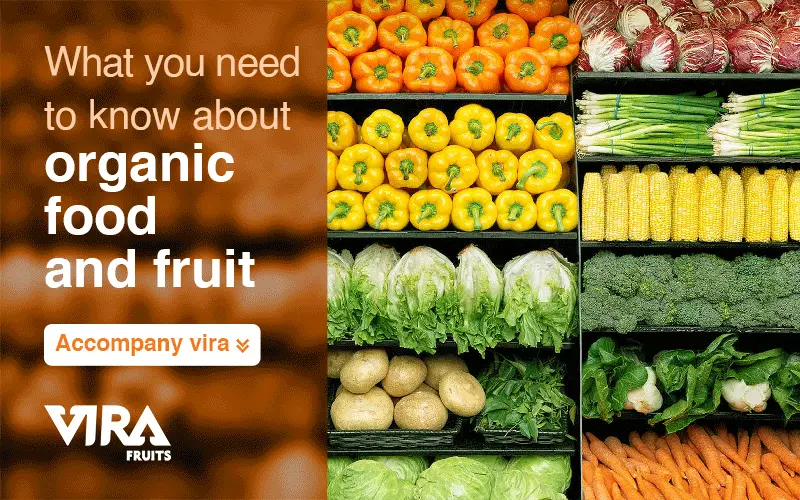The particular standard method to grow agricultural products that farmers use is known as “organic.” The goals of organic food and fruit farming are minimum pollution, enhancing water and soil pollution, harnessing the natural behaviors of animals, providing a safe and healthy environment for animals, and ensuring that the resources are managed in a self-sustaining manner.
Natural vs. organic food and fruits
Despite the fact that natural, healthy, and organic are often used as synonymous, they have different meanings. Natural products are those that are not synthesized or added artificial ingredients. In organic food and fruits, pesticides, fertilizers, or herbicides are not used. In this type, farmers make sure that animals that are expected to give organic food and fruits, are not given any hormones and fed natural feed. Natural and organic foods are commonly referred to as “health foods,” along with products that have undergone less processing than usual, such as stone-ground whole-grain flour.
According to some, organic foods are more nutrient-dense than conventional foods, but the evidence for that is confusing. Nutritional value is also affected by how the food was harvested, stored, and in what process.
What are the benefits?
The way your food is produced, raised, and grown is highly important because your mental and physical health is highly dependent on and affected by that. Since organic food and fruits have more beneficial and valuable nutrients, allergic people may experience less allergic reactions to them.
Pesticides are used less frequently on organic produce. Conventional agriculture makes widespread use of chemicals such as synthetic pesticides, herbicides, and insecticides, and the residues remain in our food. Since they are free of preservatives, their shelf life is shorter, and as a result, they are fresher.
Farming that is organic is generally more environmentally friendly. Environmental benefits of organic farming include reducing pollution, conserving water, reducing soil erosion, increasing soil fertility, and using less energy. In addition to being better for nearby birds and animals, farming without synthetic pesticides is better for the people who live near the farm.
Antibiotics, growth hormones, and animal byproducts are not added to the diet of organically raised animals. Healthy organic animals are given more room to roam and are allowed to spend more time outdoors, which promotes their physical well-being. Certain nutrients may be more abundant in organic meat and milk. According to a study conducted in Europe in 2016, organic meat and milk are 50 percent higher in certain nutrients, such as omega-3 fatty acids, than conventionally raised versions.
How to grow organic food and fruits
This is the government that has high and strict standards for organic agriculture. These standards say that the products must be free of toxic pesticides and synthetic fertilizers, antibiotics, hormones, sewage sludge, organic fertilizers, or genetic engineering.
The organic farmer knows what goes into the soil directly affects the yield. For this reason, they use crop rotation, mulches, cover crops, hand weeding, and hand-weeding to enrich the soil where they are growing their vegetables, rather than toxic and persistent pesticides, herbicides, and synthetic nitrogen fertilizers. They know that, in this case, the grown plant will include the nutrient they need. Additionally, it facilitates the absorption of micro-and macronutrients such as Vitamin C, which, in turn, results in a more nutrient-dense crop and better-tasting produce.
The process begins with the maintenance of healthy soil, which nourishes plants and reduces the incidence of plant diseases. Taking care of land without the use of prohibited materials for at least three years is required to earn organic certification. The organic farm operator must develop a plan of organic operation under the oversight of their certification agency, which also carries out annual third-party inspections.
Conclusion
The organic food and fruit that are highly recommended to be used are not easily raised and grown. The process is hard and takes time and the regulations are strict. As a result of this hard work, the final product is reliable.
